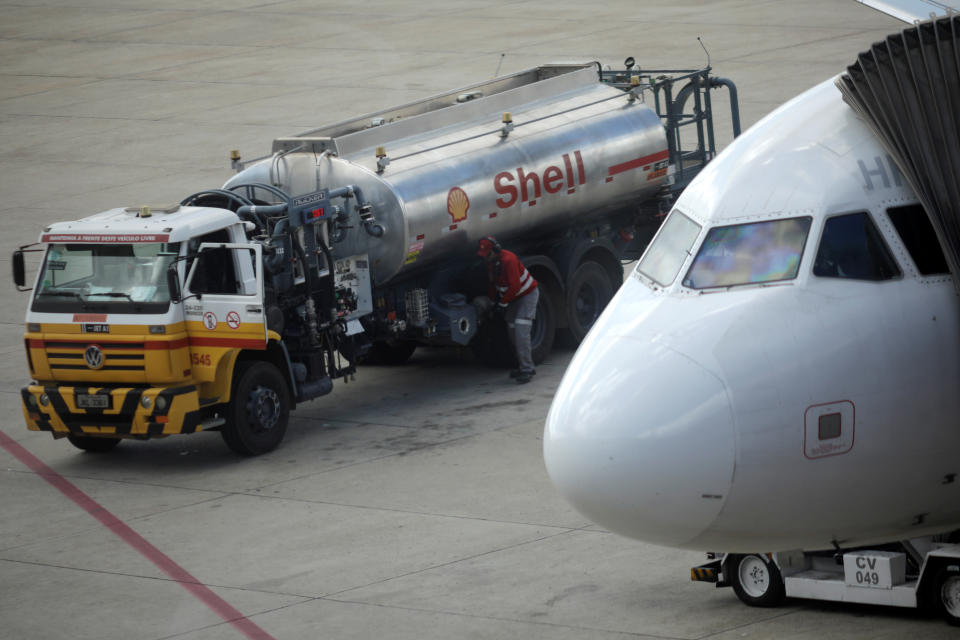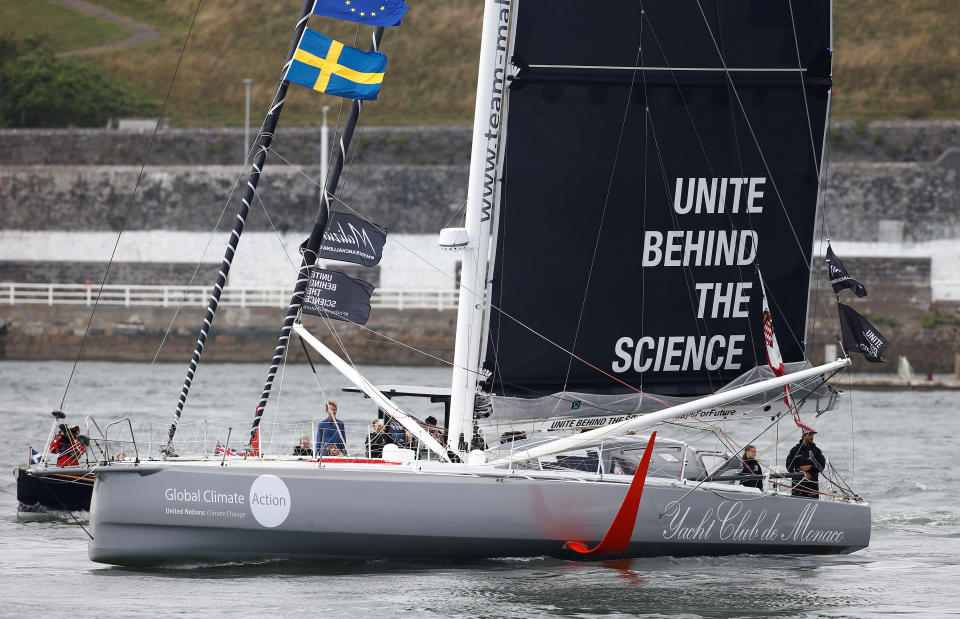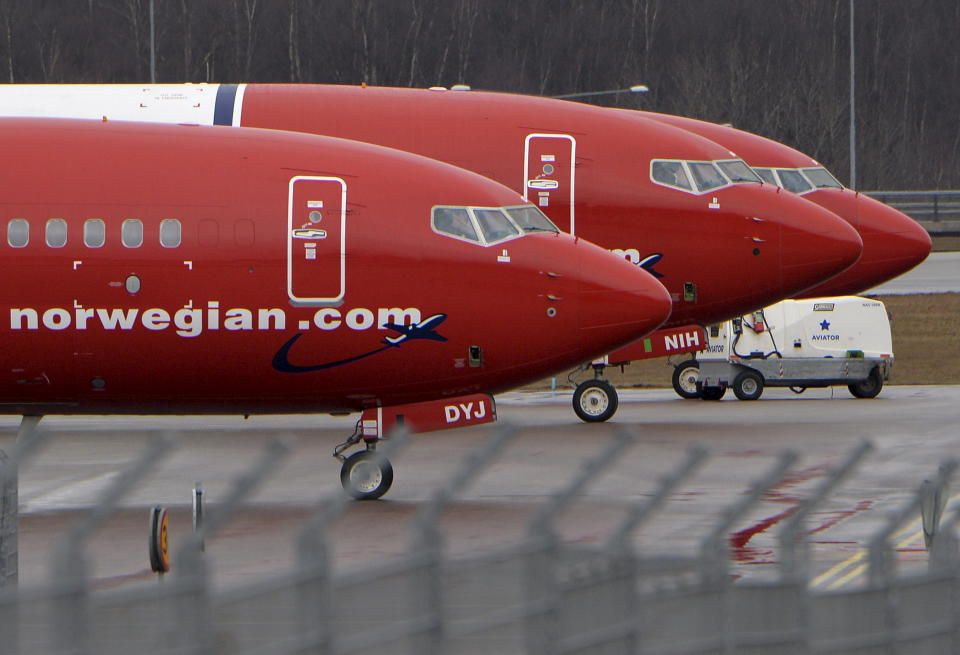‘Flight shame’: A potential headwind for airlines in Europe

BERLIN - Greta Thunberg, the 16-year-old climate change activist from Sweden, is crossing the Atlantic in a sailing vessel because she refuses to fly. Thunberg’s choice — she hasn’t flown since 2015 — highlights a rising headwind for the airline industry: “Flygskam,” which is Swedish for “flight shame.”
“Flygskam” (which may be replacing “hygge” as the latest Scandinavian buzzword) is centered around the fact that studies show airlines are a major factor in the increase in greenhouse gases and climate change.
In June, flight shame was a topic at an aviation summit in Seoul, where International Air Transport Association head Alexandre de Juniac told CEOs: "Unchallenged, this sentiment will grow and spread.” De Juniac added that the industry was doing more than other industries to combat the problems, which companies by and large recognize.
“Someone flying from London to New York and back generates roughly the same level of emissions as the average person in the EU does by heating their home for a whole year,” a study from the European Commission notes.

Because of flying’s substantial cost to the environment, Europe has been experiencing a pushback against air air travel and is trying to steer travelers toward trains and buses, aided in part by groups like Fridays for Future as well as political parties.
“Flygskam has become a massive topic in Sweden and Scandinavia,” said Anders Lindstr?m, a spokesperson for Norwegian Air, a major European carrier. “We have, however, not noticed a major trend of less bookings, but what we have noticed is travelers becoming more aware and knowledgeable.”
Airlines like Norwegian and Lufthansa have been sensitive to the rise of Flygskam. Though Norwegian Air tells Yahoo Finance that it hasn’t led to any changes in policy, increased environmental concerns have been a factor in the company’s decision to feature its fuel-efficient fleet and environmental awards in promotions.
“It has partly changed the customers’ behavior in terms of their key criteria when choosing an airline, now also weighing in fleet age or [corporate social responsibility] focuses,” Lindstr?m said.
Domestic flight bans are extremely unlikely. But the topic has been raised.
In Germany (“die Flugscham”), climate activist Luisa Neubauer suggested earlier this year that a ban on domestic air travel could be “conceivable.” A senator in Hamburg agreed with the idea and also said an airline fuel tax made sense. Both argued that flying should be more expensive, a prospect some find may simply make flying just for the rich, once again.
On Friday Bernd Riexinger, the co-chair of Die Linke, a left-wing German political party, suggested the German train system, Deutsche Bahn, ought to get rid of first-class seating to make room for more passengers. (A German passenger group countered by suggesting more train cars instead are what’s needed to deal with overcrowding, the Guardian reported.)
The German newspaper Die Welt noted that German companies have been urging employees to use the rail system more and more.

However, in Germany and in Europe, flying is far cheaper than trains, part of the reason for Riexinger’s comments. "9.90 euros on Ryanair – that silences the environmental conscience,” Die Welt commented. For many companies, the price difference is simply just too great to combat even strong calls to fly less.
Most domestic and even intra-European air travel is very cheap: A quick look at Ryanair’s website shows flights from London to Spain for under 9 pounds (almost US $11). Internationally, this tends to be the case, but even domestically, ticket prices can be higher for trains unless you buy them in advance. A sampling of dates by Yahoo Finance showed that in plenty of cases flying was cheaper as well as much faster, even with an improved high-speed service between Munich and Berlin (138€ vs. 110€, or US $152 vs. $122).
Instead of the more expensive train, companies like Allianz, Deutsche Post and Commerzbank simply pay for carbon offsets for business travel, Die Welt reported. Flying is still inexpensive in many parts of the world, even if markets are consolidating somewhat — trans-Atlantic roundtrip tickets can still be had for less than $400 if you’re lucky. As long as that’s the case, airlines maintain their cost advantage.
Cheap seats present an interesting conundrum for travelers who want to be green. Scott Keyes, who runs the popular flight newsletter Scott’s Cheap Flights, told Yahoo Finance that while airlines’ contributions to greenhouse gases are a growing problem, flying for many people isn’t just a trivial or optional thing people do, and that not all passengers contribute in the same way.
“it's the passengers paying for business and first class who are providing significant profit margins for the airline, and their demand has far more impact on an airline's volume of flights,” he said. “A general rule of thumb: the cheaper your ticket, the lower your carbon footprint.”
Keyes takes has a similar stance to that of Riexinger, the German politician, albeit for planes, not trains.
“In addition to a carbon tax and other environmental mitigation efforts, there's a simple way to make airlines significantly greener, and it could be done virtually overnight: get rid of first class,” he said. “The fewer people on a plane, the less efficient use of fuel it is. That's why budget airlines like Frontier (FRNT) and Spirit (SAVE) are considered the greenest airlines, significantly outpacing airlines with premium cabins like Delta (DAL) and American (AAL).”
For now, global demand is growing
Global demand is not slowing down for flying. The IATA expects airline travel to double in the next 20 years. This, of course, will exacerbate the emissions problem, but it also underscores the need for global transportation. One spokesperson for a major airline told Yahoo Finance that they haven’t seen any changes in demand and noted that there isn’t likely to be given the fact that trains are slower. (Train enthusiasts say that because airports are outside the city, it offsets part of that advantage.)

Even in Europe, where travel between major destinations is shorter, flying takes a fraction of the time, even compared with high-speed trains. This is one reason why the United States has not had the same kind of discussions as Europe — the country is just too big for train travel everywhere, and even where trains are or could be possible, the infrastructure is not nearly as developed as in Europe.
With global demand for transportation looking strong, it seems unlikely at this point this will present anything like an existential threat to the airline industry. But even if it doesn’t completely reshape it, it could have smaller effects on airlines’ profitability.
Already airlines have been working hard and spending a considerable amount of money to show they’re part of the solution to the global climate crisis. Many airlines have been buying biofuels, replacing the fleet with modern fuel-efficient planes, and offering “carbon offsets.” (Essentially you can pay to offset your carbon emissions and the money goes to CO2-negative programs.)
At the present, this global movement seems to have not yet reached the U.S. in the same way as it has in Europe. But if this gets more global steam as a movement, it could have larger effects on airlines’ bottom lines.
-
Ethan Wolff-Mann is a writer at Yahoo Finance focusing on consumer issues, personal finance, retail, airlines, and more. Follow him on Twitter @ewolffmann.
The era of insanely cheap flights to Europe may be coming to a close
Follow Yahoo Finance on Twitter, Facebook, Instagram, Flipboard, SmartNews, LinkedIn,YouTube, and reddit.